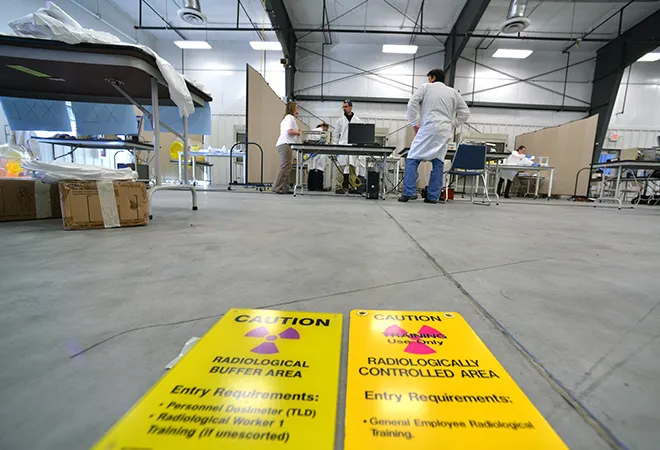-
CENTRES
Progammes & Centres
Location
Although the global efforts towards nuclear non-proliferation have been strengthened by treaties like the NPT, it is important to assess and evaluate the effectiveness of established systems and make necessary changes to improve the overall effectiveness of such mechanisms to succeed.

The Nuclear Non-Proliferation Treaty (NPT) came into force on 5 March 1970 and completed 50 years this year. The treaty has been historically described as the “turning point in the global march towards disarmament.” The objective of the NPT has been to “prevent the spread of nuclear weapons and weapons technology, to promote cooperation in the peaceful uses of nuclear energy and to further the goal of achieving nuclear disarmament and general and complete disarmament.” The NPT has 190 signatories, including five nuclear weapons states, and was extended indefinitely in 1995. With the NPT completing 50 years, it is important to re-evaluate and articulate the future of the treaty and the global nuclear non-proliferation and disarmament.
Since the treaty came into force in 1970, parties have come together every five years to review the implementation of the NPT at the ‘NPT Review Conferences.’ The conferences were designed for the envisioning and implementation of recommendations to further the process of global disarmament and assess substantive outcomes as a result of the NPT. The previous iteration of the conference in 2015 failed to reach a consensus on the final document created to promote the pillars of the treaty. The latest edition of the review conference was set to take place at the United Nations Headquarters in New York from 27 April to 22 May, 2020. However, it has been postponed due the global COVID-19 pandemic.
Although it is one of the few treaties that enjoys a near universal membership on disarmament, the efficacy of the NPT has been brought into question as it completes five decades. The NPT’s ability to prevent the spread of nuclear weapons as it was brought into force is commendable. However, the NPT seems to be an inadequate measure against the rising threats in the current nuclear age. There are several concerns with regards to nuclear non-proliferation that need to be addressed as the NPT comes up for review in the near future. Since the treaty’s inception, the threat to the prospects of disarmament has intensified due to the increase in nuclear weapon states outside the treaty, as well as the hostile interactions between states on the issue of nuclear proliferation.
The NPT’s success in containing the spread of nuclear weapons has come into question with the advances in North Korea’s nuclear weapons programme, Iran’s intentions of building nuclear weapons, the shift in United States’ approach to arms control arrangements. The lack of consensus at the 2015 review conference also gives rise to uncertainty of the future of the NPT. Countries like India and Pakistan’s nuclear weapons programmes date back to 1967 and 1972 respectively; North Korea has withdrawn from the NPT and extensively improved and strengthened its nuclear weapons arsenal; and Iran’s uranium enrichment activities (since US’s JCPOA withdrawal) suggest an improved capacity to build nuclear weapons as well. The treaty has been not successful to the extent in preventing these countries from pursuing nuclear routing. The lack of consensus among the major powers on the future of the NPT as well as specific NPT challenges has remained a key challenge to the creation of an effective mechanism in addressing the issues of non-proliferation and disarmament.
The global nuclear world order has not only witnessed horizontal nuclear proliferation, but vertical nuclear proliferation also reflects the NPT’s inability to successfully shift towards complete nuclear disarmament. Nuclear weapons states such as United States, Russia and China have emphasised the importance of promoting nuclear disarmament but they continue to invest in building up their nuclear arsenal in terms of size and sophistication. Given their status as permanent members of the UN Security Council, the contradiction between the rhetoric and reality is not lost upon key actors and observers within the global nuclear order. Although many nuclear powers continue to reaffirm their commitment towards achieving complete disarmament and nuclear non-proliferation, the move towards attaining this has been slow to put it mildly. Nuclear weapons states, outside of the NPT, have historically criticised the discriminatory nature of the treaty.
Although the global efforts towards nuclear non-proliferation have been strengthened by treaties like the NPT, it is important to assess and evaluate the effectiveness of established systems and make necessary changes to improve the overall effectiveness of such mechanisms to succeed. The need to articulate the possibility of a future with complete and total disarmament requires a complete reassessment of how the international community and key actors approach the persisting NPT-specific challenges. The success of the NPT in the future rests upon a number of considerations including a neutral and indiscriminate mechanism and a systemic shift, making acquisition of nuclear weapons unattractive to all state actors.
Making efforts at building consensus among major powers is key at this stage. At the 2010 review conference, then UN Secretary General Ban Ki-moon said that “Let us remember that you are here not simply to avoid a nuclear nightmare, but to build a safer world for all.”
The views expressed above belong to the author(s). ORF research and analyses now available on Telegram! Click here to access our curated content — blogs, longforms and interviews.

Pulkit Mohan is the Head of Forums at ORF. She is responsible for the ideation curation and execution of ORFs flagship conferences. Her research focuses include ...
Read More +